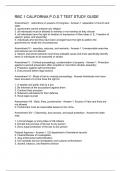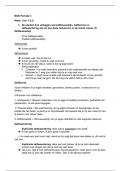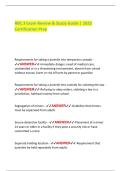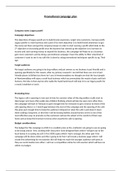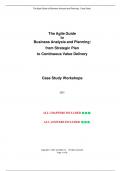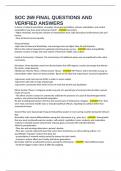Central argument: The primary payoff to the firm for incurring these costs associated with the three
dimensions of justice is that it enjoys relationships with stakeholders who positively reciprocate, and
that the cooperation of such stakeholders collectively generates rents.
- A company can create value by sharing it with stakeholders. Of course, the amount of value a
firm can create in this way is subject to decreasing marginal returns. That is, firms can
allocate too many resources to stakeholders. In an efficient market, firms create rent by trying
to maximise their utility while conforming to the norms and values of society.
Conclusion
Rather than being purely self-interested, people behave reciprocally, rewarding others whose actions
they perceive as fair, and willingly incurring (increasing) costs to punish those they perceive as unfair.
Economists show that employers who are perceived as distributively fair by their employees generate
comparatively more value through the positive reciprocal behaviour of those employees. The
literature on organisational fairness distinguishes two additional types of fairness judged by
employees. Drawing on both bodies of work, we use stakeholder theory to propose how perceptions
of fairness lead to reciprocity that (1) extends to all stakeholders of the firm and (2) affects firm
performance. Specifically, we discuss how stakeholders' perceptions of a firm's distributive,
procedural, and interactional justice affect their behavior towards the firm.
Based on the assumption of reciprocity, firms should distribute (surplus) value in the form of material
resources, procedural justice and/or interactional justice to a broad group of stakeholders in order to
create value. In distributing this value, the firm creates a pattern of positive reciprocity among its
stakeholders that supports the creation of additional rent.
Week 4
Lecture 6
The pyramid principle
Minto, B. (1998). Think your way to clear writing. Consulting to Management, 10 (1), 33
SCQA: Situation (what we all know), Complication (why do we pay attention to it), Question (which
question should therefore be answered), Answer
Ensure that your pyramid is Mutually Exclusive and Collectively Exhaustive (MECE)
Mutually Exclusive; means that all items in each category belong only to that category.
Collectively Exhaustive: means that all the possibilities have been covered.
Ensure that each category of your pyramid doesn’t contain too many subcategories
- Ensure a vertical logic by answering the questions why and how
2 types of logic:
The concept of deduction = a coherent and logic way of reasoning which automatically leads to a
conclusion. → lean on previous findings.
The concept of induction = a chain of non-related statements which make it possible to draw a
certain conclusion
dimensions of justice is that it enjoys relationships with stakeholders who positively reciprocate, and
that the cooperation of such stakeholders collectively generates rents.
- A company can create value by sharing it with stakeholders. Of course, the amount of value a
firm can create in this way is subject to decreasing marginal returns. That is, firms can
allocate too many resources to stakeholders. In an efficient market, firms create rent by trying
to maximise their utility while conforming to the norms and values of society.
Conclusion
Rather than being purely self-interested, people behave reciprocally, rewarding others whose actions
they perceive as fair, and willingly incurring (increasing) costs to punish those they perceive as unfair.
Economists show that employers who are perceived as distributively fair by their employees generate
comparatively more value through the positive reciprocal behaviour of those employees. The
literature on organisational fairness distinguishes two additional types of fairness judged by
employees. Drawing on both bodies of work, we use stakeholder theory to propose how perceptions
of fairness lead to reciprocity that (1) extends to all stakeholders of the firm and (2) affects firm
performance. Specifically, we discuss how stakeholders' perceptions of a firm's distributive,
procedural, and interactional justice affect their behavior towards the firm.
Based on the assumption of reciprocity, firms should distribute (surplus) value in the form of material
resources, procedural justice and/or interactional justice to a broad group of stakeholders in order to
create value. In distributing this value, the firm creates a pattern of positive reciprocity among its
stakeholders that supports the creation of additional rent.
Week 4
Lecture 6
The pyramid principle
Minto, B. (1998). Think your way to clear writing. Consulting to Management, 10 (1), 33
SCQA: Situation (what we all know), Complication (why do we pay attention to it), Question (which
question should therefore be answered), Answer
Ensure that your pyramid is Mutually Exclusive and Collectively Exhaustive (MECE)
Mutually Exclusive; means that all items in each category belong only to that category.
Collectively Exhaustive: means that all the possibilities have been covered.
Ensure that each category of your pyramid doesn’t contain too many subcategories
- Ensure a vertical logic by answering the questions why and how
2 types of logic:
The concept of deduction = a coherent and logic way of reasoning which automatically leads to a
conclusion. → lean on previous findings.
The concept of induction = a chain of non-related statements which make it possible to draw a
certain conclusion



